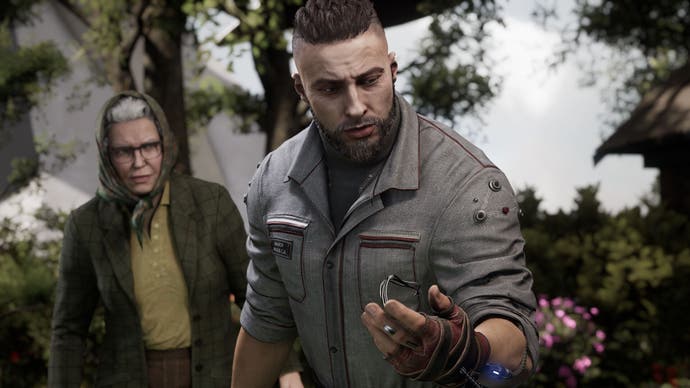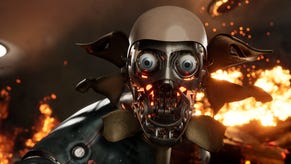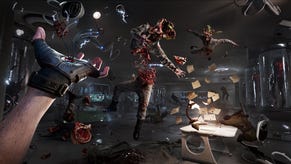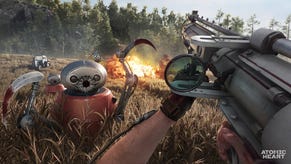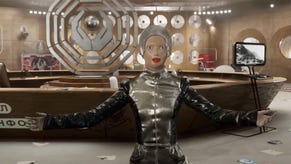Atomic Heart review - confusion and fear reflects the growing concerns of an industry
Fallout.
There have been lots of questions about Atomic Heart, but maybe the biggest remains the question of just what exactly it is. As it turns out, like a lot of games that front-load on the dramatic marketing events, spark off controversies, and define themselves by reference to other, beloved games rather than on their own terms, Atomic Heart doesn't really know what it is either. If you're like me, you'll probably get a good way through the game before you have much of a clue yourself.
Before you get to that point, you will most likely know it as at least "controversial" - and there have been just a few controversies. As we've reported elsewhere in more detail, developer Mundfish has come under scrutiny for, first, putting on some poorly timed marketing events in Russia, featuring big red banners reading "Glory to Soviet Engineers" during the country's own land-grabbing, and deeply horrifying, invasion of Ukraine.
There's been concern and confusion over Mundfish's funding, with one of its key investors being tied to state-controlled Gazprom in a couple of ways. And to lesser concern, questions about the studio's own origins and location. There was a disappointing non-statement about the Ukraine war in response: "global team... innovative game... pro-peace organisation... against violence against people," and so on. Plus this old gem for good measure: "we do not comment on politics or religion." Then there's the data scandal, about its Russian store website allegedly including a clause informing users their data may be collected and sent to Russian state authorities, which Mundfish emphatically claims to be "outdated". And there's also the "racist cartoons" controversy. (Curiously, they appeared in the PC version but on Xbox, where we played, a large number of TV screens have just been blank white since launch.)
And there's more! Ukrainians have noted that the game's scene-stealing ballerina robots - which are also, you discover in-game, sex robots - bear an uncomfortable resemblance to Yulia Tymoshenko, a Ukrainian politician reportedly loathed in Russian political circles and known for, among her staunchly pro-NATO, pro-EU, anti-Eurasian Customs Union stances, her distinctive blonde, plaited hairstyle. And last but not least, there's Atomic Heart's release date, on the one-year anniversary of a Vladimir Putin speech which more or less kicked off the war. As a result of all this, Ukrainian retailers have reportedly refused to stock the game, while its government contacted Sony, Microsoft, and Valve requesting a ban on selling it in the country. Mundfish has not responded to any of Eurogamer's requests for comment on all of the above, but you can read about much of it in more detail in our report.
Making one or two questionable mistakes, of course, is easy enough to chalk up to clumsiness - plenty of other games in our deeply awkward, foot-in-mouth enthusiast of an industry have made and then atoned for a dodgy mishap. Three or four though and you really are rapidly approaching the region of naivety and ignorance. Fool me twice, and all that. Atomic Heart, by my count, has been through at least seven before it had even been out for a full day.
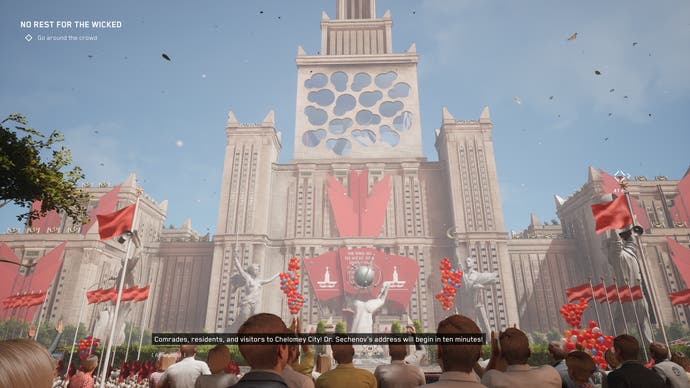
What is Atomic Heart? Look at all the above as a whole, and Atomic Heart looks like a classic case of dog-whistling: each individual controversy has enough plausible deniability to never quite be conclusive - there's fear of retribution for anti-war statements; everything in Russia has a problematic state investor; they forgot the racist bits from that cartoon; the we-steal-your-data policy was outdated; the "Glory to Soviet Engineers!" stuff is just marketing; lots of people have that one exact, historically significant, Ukrainian hairstyle! And changing the release date would, er, require a bit of paperwork? - but it's enough circumstantial evidence to know that something here seems, at very best, off.
What's strange, though, is that all of this sits in quite stark contrast to the actual game. Atomic Heart is far closer to being a critique of Soviet Russia than it is a ringing endorsement of it. Its story is a condemnation of Soviet power struggles, corruption, and willful bureaucratic ignorance. That's not to say it's a particularly brilliant one, and it's delivered with all the subtlety of an exploding pig, as AAA games' allegories often are - hardly an HBO's Chernobyl - but it's there. The problem is its own bluster, its noise, its puffed-up chest and macho-baiting promotion, has confused things a little - and that the intentions behind that noise remain unclear.
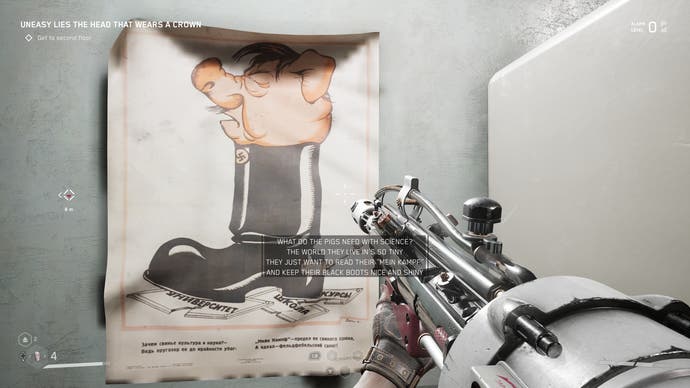
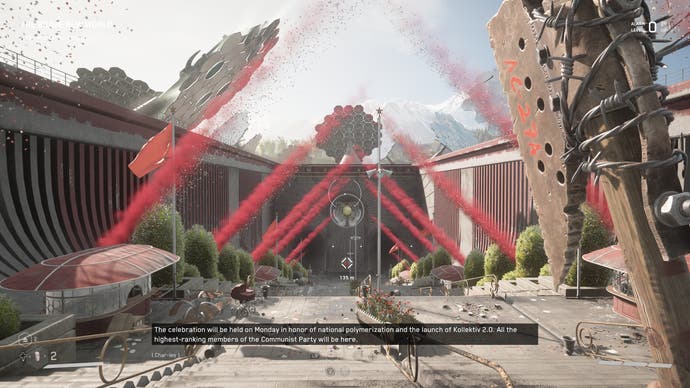
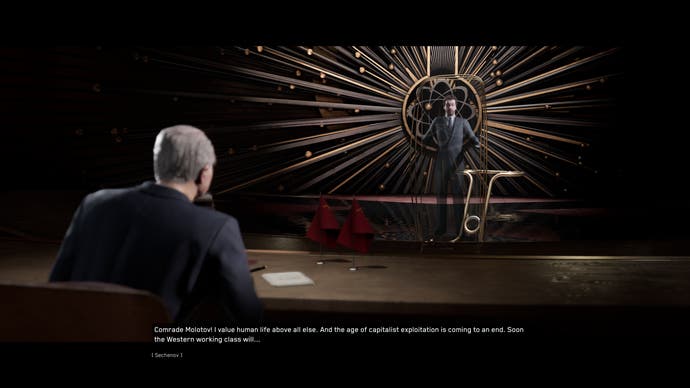
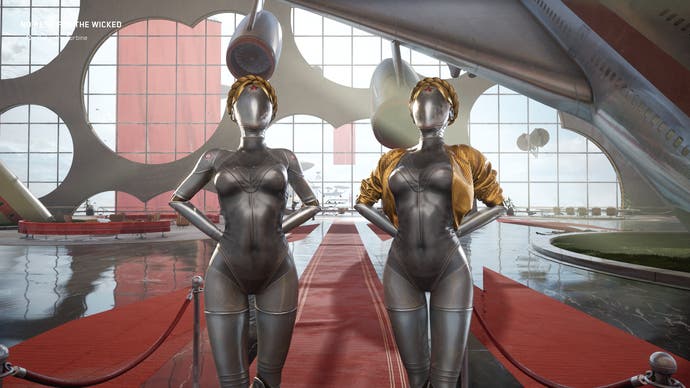
That's most apparent in its introduction, a good half-hour of combatless, linear narrative where you'll walk through the streets and canals of a glorious, flying city of the Soviet future (Bioshock Infinite: check). It's front-loaded with spectacle, as confetti rains and you're whisked away on flying tours through blue skies, getting blasted with radio fanfare as you work your way over the maglev bridges and brutalist monuments and vast, pristine statues holding giant, golden sickles. You're introduced to the robo-sex-ballerinas, who move like they were animated by an OpenAI chatbot fed only on men-writing-women memes, breasting boobily at you across the room. The protagonist, known as P-3, a spec-ops bro with an undercut, mouths off at every well-mannered 'bot he finds like an insufferable, budget BJ Blazkowicz, mocking them, mocking his helpful magic AI glove, Charles, mocking every puzzle, challenge, and locked door of the game itself.
After that lengthy pseudo-cutscene though, things suddenly switch to a kind of Resident Evil-style horror game, as you descend into a haunted house of a testing facility and scrabble about in the dark between blood streaks and dismembered corpses for makeshift weapons and scraps of ammo, searching for lock combinations, skulking through shadows past the animatronic moustaches who all seem frightfully overpowered or, more often, triggering the alarm and frantically clonking them on their armoured heads with a taped-together axe. Then you're on the surface, and it's open-world Metal Gear, with security cameras every five yards and patrolling buzzsaws everywhere you look - and lots of cardboard boxes, for good measure. Then you're climbing yellow-painted ledges like, well, anything made by Sony, and sitting in Fallout shelters watching cutesy 50s info-toons with the Soviet knockoff Vault Boy while you craft shotgun ammo and upgrade your backpack storage, before you're back off underground.
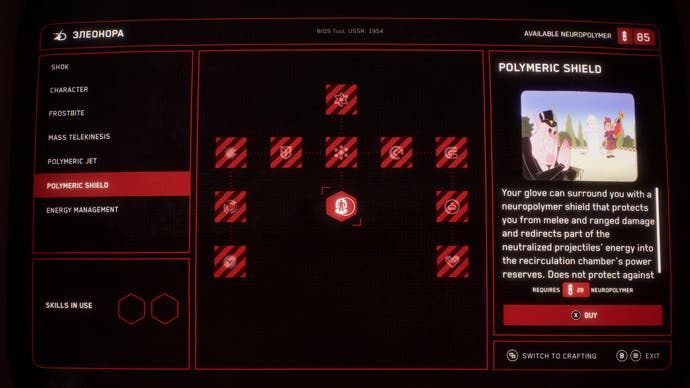
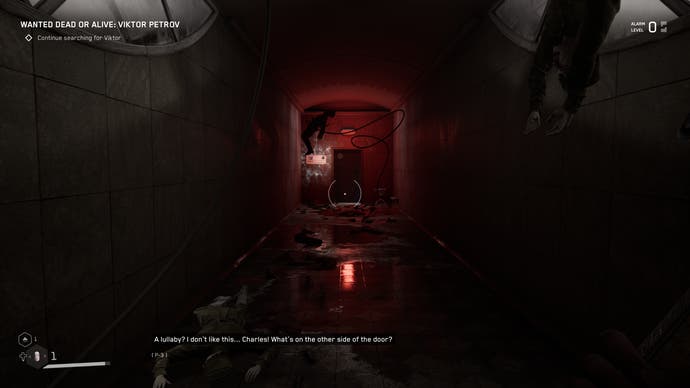
All of which is to say: many of Atomic Heart's problems are much more boring than the controversy would have you believe. It's a grab-bag of ideas from other games that made them their own, and viewed as a whole it's derivative and over-ambitious, a game designed according to a fourteen-year-old's elevator pitch: open world! Challenging combat! Spooky gore! Sexy robots! Guns! Climbing! Puzzles! Stealth! Crafting! A granny, but she has guns and swears! Magic! All this stuck together like the Homer Simpson Car in playable form. A game seemingly dragged through development by its marketing team - imagine the trailers, think of the back-of-box bullet points! - instead of being spurred on internally by cohesive design. Which is a shame because, individually, these disparate parts are often quite good.
The not-Vault-Boy cartoons, for instance, are wonderfully detailed little skits about chasing off evil capitalist pigs, presented in the sumptuously eerie atmosphere of this game's menus, which flicker and fuzz in emergency red over the wails of distant air sirens. Combat, to be fair, is a little rudimentary. At times, hacking bluntly with one hand and zapping with the other, it can feel like Elder Scrolls' famously limited first-person combat, but without the blocking and a fraction of the spells - and enemies often move faster than your camera can turn on console, without cranking the responsiveness to unusable levels, and you'll regularly get punted to the floor from behind without warning that an enemy was even there. And the boss fights drag, often a case of relentlessly dodging and scratching away with puny blades and potato-gun bullets for miniscule damage. But! Eventually, it does gel a bit, as you learn its strange rhythms and unlock a bit more left-handed synergy.
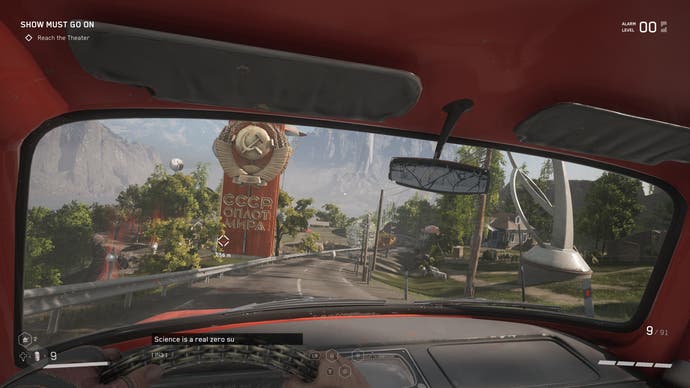
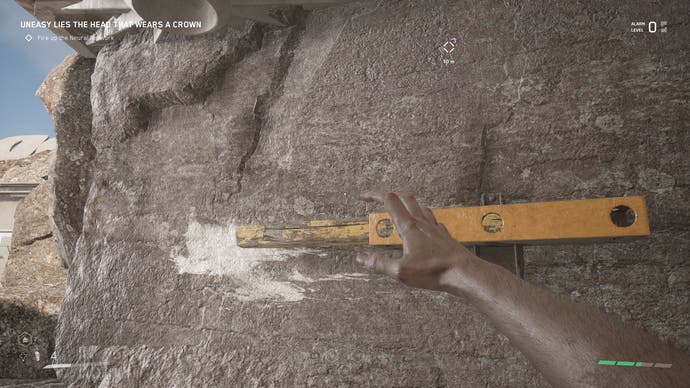
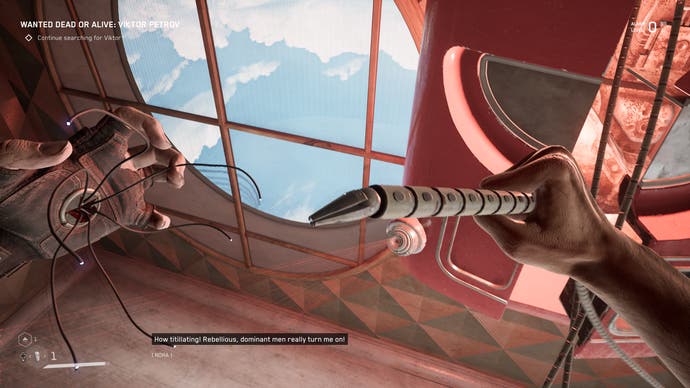
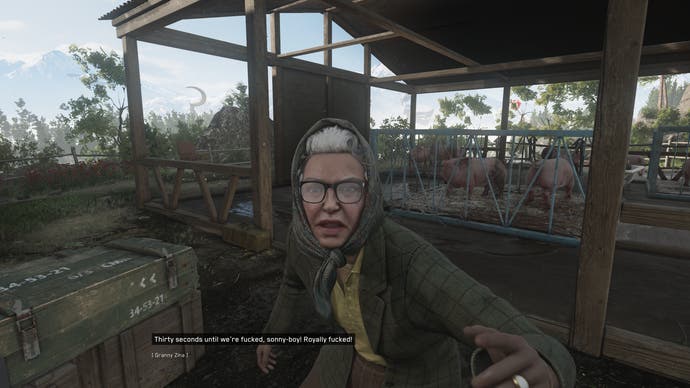
Best of all, and most surprisingly, there is a decent story here - and P-3 becomes, dare I say it, quite likeable in time. Those early hours are really an elaborate fake-out, as he walks the path from true believer to something more like furiously betrayed. Like a lot of big-budget action games with ambitions of Saying Something, a lot of momentum is lost to plottiness, as a tight six-hour story is dragged out over more like fifteen so as to make room for all the open-worlding, but the core is here and it is, at times, quite powerful. P-3 is not a smart man, by his own admission, while his companion Charles is a very smart glove. The former gradually having his world shattered through the gentle, if sometimes patronising exposition of the latter makes him oddly sympathetic. A militarised zealot who thought he was fighting for good - with good reason: look around at all this shiny, progressive utopia on the surface - is realising he was just a tool on the wrong side.
The reality is video games are increasingly compromised... with Atomic Heart the confusion almost feels like the point.
Between the on-the-nose stuff in the shadowy NERVesque Politburo and spooky hospitals there is some smart work supporting all this, too. Cutscenes are gratuitously long but the score, from composer Mick Gordon, who explained to us the reasoning behind donating his fee to Red Cross Australia's Ukraine Crisis Appeal, is a stunner, with massive, sweeping range from balletic orchestras to techno-djent. Camerawork is thoughtful and, for once, a little playful, a rare example of a game realising it's not bound by the usual rules of physics that restrict movement here in the real world, wafting the POV around rooms like a voyeuristic drone.
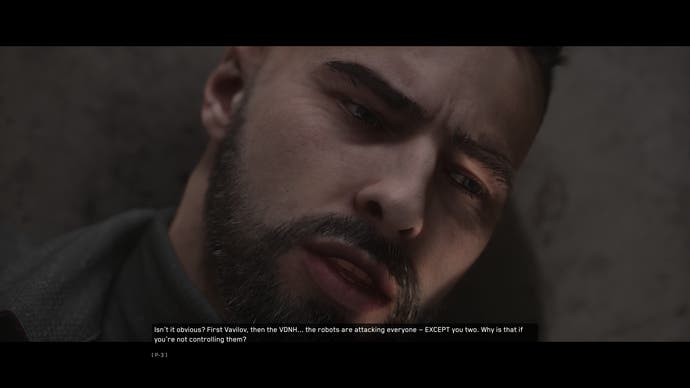
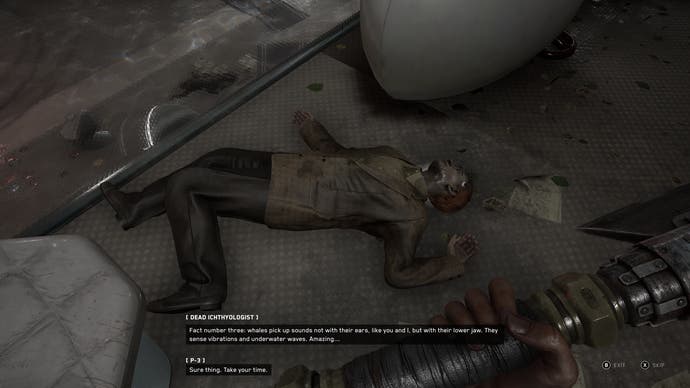
Fundamentally, there is some good stuff here, between the creaking joints that hold it together and beneath the noise of its own making. Atomic Heart is in some way emblematic of the awkward position in which video games as a whole find themselves. Its marketing, the way it's presented itself to the world, has if anything seemed an intentional play for the reactionary audience, the people who have an answer for all seven-plus controversies and counting, who would defend it even if they didn't, who monetise rage and spite. Its taunting, unapologetic attitude serves to unite fans against critics with a kind of siege mentality - they're out to take our games with all their politics! - reminiscent of the way some parts of the Russian public have, if anything, only strengthened their support for the war in the face of senseless Russian deaths. To them, to criticise a game is to criticise all who even thought of playing it. Never mind the irony of what the game itself is really about.
It's also reminiscent of the mess video games are increasingly finding themselves in, and the difficulty the industry has had in responding. The reality is video games are increasingly compromised by their lust for funding, be it through the deals an artist must make to get their passion off the ground in a commodified industry, or the sheer desire, from the top, for more. Each day more games are more closely tied to governments, kingdoms, autocracies, donations, and in many cases downright awful people. With Atomic Heart specifically, the confusion, like the discord sowed by Russian bots popping up in Facebook groups on both the left and the right, almost feels like it's the point, morality weaponised against the wielder through whataboutism and panic - and all of it, here at the very heart of the engagement economy, leading to eyeballs, and eyeballs leading to sales.
That's one, cynical reading, at least - the trouble with Atomic Heart is nobody really knows. With other games there will be other problems. But each of them is their own thing - no two controversies are perfectly analogous and no two situations the same - and so we have to respond to each one in the way that suits it. Although the lesson, I think, still is the same: a desire to do the right thing being weaponised against you doesn't mean you should stop trying. It means you should try harder.
